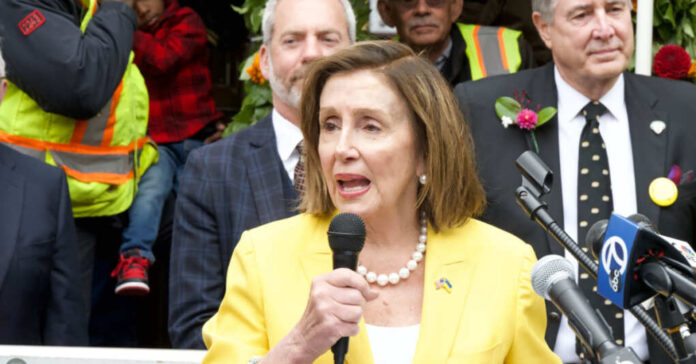
In a recent turn of events, Representative Nancy Pelosi (D-Calif.) has called on the FBI to delve into the activities of pro-Palestine protesters, insinuating potential connections to Russia due to their advocacy for a Gaza ceasefire, which she has boldly dubbed as the “Mr. Putin’s message.”
During a candid interview with CNN on January 28, Pelosi expressed her concerns about the ongoing pro-Palestine demonstrations, especially those disrupting Democratic events, including her speech in Seattle. She asserted, “They’re in front of my house constantly. So, I have a feeling for what feelings they have. But we have to think about what we’re doing.”
The Former House Speaker emphasized the need to address the humanitarian crisis in the conflict, stating, “But for them to call for a ceasefire is Mr. Putin’s message, Mr. Putin’s. This is directly connected to what he would like to see.”
In a rather assertive tone, Pelosi linked the protests to Russia’s interests, drawing parallels with the situation in Ukraine. She stated, “Same thing with Ukraine. It’s about Putin’s message. I think some of these protesters are spontaneous, organic, and sincere. Some, I think, are connected to Russia. And I say that having looked at this for a long time now.”
When pressed on whether she believes some protesters are “Russian plants,” Pelosi clarified, “I don’t think they’re plants. I think some financing should be investigated. And I want to ask the FBI to investigate that.”
Amidst the 100-day-long Israel-Gaza conflict, various activist groups have called for a ceasefire. The war erupted after a Hamas attack on October 7, leading to an Israeli military campaign in Gaza. Pro-Palestine protesters have made their presence felt at Democratic events, including Pelosi’s speech in Seattle and multiple appearances by President Joe Biden.
The Council on American-Islamic Relations (CAIR), the most significant Muslim civil rights and advocacy organization in the United States, condemned Pelosi’s statements, describing them as “delusional” and accusing her of exhibiting authoritarian tendencies. CAIR’s national executive director, Nihad Awad, expressed deep concern about Pelosi’s call for an FBI investigation without concrete evidence.
Defending Pelosi’s remarks, a spokesperson for the Democrat lawmaker pointed to political scientist Ian Bremmer’s post, asserting that “Putin benefits from the continued war in Gaza and expanded chaos in the Middle East.” The spokesperson emphasized Pelosi’s awareness of foreign adversaries meddling in American politics and her desire for further investigation ahead of the 2024 election.
The Russia angle in this situation is not merely a speculative twist. Analysts suggest that Russia could benefit from the Israel-Gaza conflict in several ways. The conflict might divert U.S. focus and resources to the Middle East, potentially weakening support for Ukraine. President Biden’s proposed $105 billion aid package for Ukraine, Israel, and the U.S. southern border faces hurdles in Congress, raising questions about future financial support for Ukraine.
Nikita Smagin, an expert on Iran with the Russian International Affairs Council, noted in a December 12 post that Washington’s pro-Israel stance could undermine the West’s support for Ukraine, particularly in the eyes of nations in the Middle East. Elevated oil prices resulting from tensions in the Middle East would benefit Russia, which relies heavily on oil export revenues.
While Russia may gain from a localized and protracted conflict between Israel and Hamas confined to Gaza, experts caution that if the conflict expands to multiple fronts, it could become problematic for Russian influence in the Middle East. A geopolitical analyst, Samuel Ramani, warned of potentially disastrous outcomes for Russia if the conflict spirals out of control.
Pelosi’s call for an FBI investigation into pro-Palestine protesters with alleged ties to Russia adds another layer of intrigue to an already complex geopolitical scenario. As the Israel-Gaza conflict persists, the intertwined dynamics of international politics and regional interests continue to shape the narrative.
